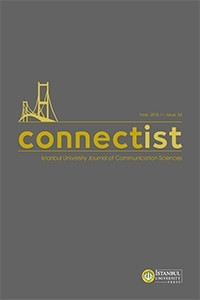KUŞAKLARARASI İLETİŞİM AÇISINDAN YENİ İLETİŞİM TEKNOLOJİLERİNİN KULLANIMI: İLERİ YAŞ GRUBU ÜZERİNE BİR DEĞERLENDİRME
Yeni iletişim teknolojileri ve sunduğu olanaklar günümüzde giderek artan bir biçimde kitleselleşmektedir. Çocuklardan ileri yaş grubuna kadar pek çok kişi, yeni iletişim teknolojileri aracılığıyla birbirleriyle ve dünyayla iletişim kurmaktadırlar. Araştırma yöntemleri açısından da yeni bakış açılarının doğmasına neden olan yeni medyanın içeriği, iletişim literatürü açısından da pek çok araştırmanın konusu haline gelmektedir. Bu araştırmaların ise daha çok metne odaklandıkları görülmektedir. Oysa bu denli heterojen bir yapıyla karşımıza çıkar yeni medya kullanıcılarının okuma pratikleri de aynı şekilde farklılıklar göstermektedir ve analiz edilmelidirler. İzler-kitle araştırmalarında ise özellikle ileri-yaş grubunun okuma ve kullanımına yönelen araştırmalarda önemli bir eksiklik saptanmaktadır. Bu yazıda ileri yaş grubunun yeni iletişim teknolojileriyle olan ilişkisi derinlemesine mülakatlar yoluyla ortaya çıkarılmaya çalışılmıştır. Böylelikle iletişim araştırmalarının çoğunlukla göz ardı ettiği medya kullanıcılarından ileri yaş grubunun kullanım pratiklerine ilişkin bir içgörü kazandırmak hedeflenmektedir. Çalışmanın sonucu, yeni iletişim teknolojilerini kullanan yaşlı nüfusun gündelik yaşamın (internet bankacılığı, hastaneler, e-devlet hizmetleri, yakınlarıyla iletişim, alışveriş vs.) pek çok alanında bu araçları etkin bir şekilde kullandığını göstermektedir.Anahtar Kelimeler: Kuşaklararası İletişim, Yeni İletişim Teknolojileri, Medya Kullanım Pratikleri USE OF NEW COMMUNICATION TECHNOLOGIES WITH A FOCUS ON INTERGENERATIONAL COMMUNICATION: ASSESSMENT OF OLDER AGE GROUPABSTRACTNowadays, new communication technologies and facilities provided by them are getting more popular; So many people, from children to older age groups, interact with each other and the world through them. New media content by offering perspectives to new research mesthods has become the subject of enormous studies in communication literature. It is found that these researches mostly focus on the text. However, such a heterogeneous new media users' practices vary and should be analyzed. In the surveys on the audiences, a significant deficiency has been determined among older age groups practises. In this paper the relationship between the older age group and new communication technologies has been studied through in-depth interviews. The aim of this study is to provide an insight about about older age groups' practices that is mostly ignored by communication researchers. The result of this study shows that the older age group using new communication technology exploit effectively this tools in everydaylife (Online banking, hospitals, e-governance services, interpersonal communication with family, shopping).Keywords: Intergenerational Relationships, New Communication Technologies, Media Usage Practices
Anahtar Kelimeler:
Kuşaklararası İletişim, Yeni İletişim Teknolojileri, Medya Kullanım Pratikleri
-
Nowadays, new communication technologies and facilities provided by them are getting more popular; So many people, from children to older age groups, interact with each other and the world through them. New media content by offering perspectives to new research mesthods has become the subject of enormous studies in communication literature. It is found that these researches mostly focus on the text. However, such a heterogeneous new media users’ practices vary and should be analyzed. In the surveys on the audiences, a significant deficiency has been determined among older age groups practises. In this paper the relationship between the older age group and new communication technologies has been studied through in-depth interviews. The aim of this study is to provide an insight about about older age groups’ practices that is mostly ignored by communication researchers. The result of this study shows that the older age group using new communication technology exploit effectively this tools in everydaylife (Online banking, hospitals, e-governance services, interpersonal communication with family, shopping).
___
- Akıncı, Vural, Z.B. & Bat, M. (2010). Yeni Bir İletişim Ortamı Olarak Sosyal Medya: Ege Üniversitesi İletişim Fakültesine Yönelik Bir Araştırma. Journal of Yasar University, 2010 20(5) 3348-338. Gallagher, D.M. (2010). Communicating Across Four Generations: Are You Mixing, Missing or Marketing Your Message?. Journal of Integrated Marketing Communications, 27-32.
- Koçak, A. & Terkan, B. (2010). Medya ve Yaşlılar: Yaşlıların Medya İzleme Davranışları ve Motivasyonları. Konya: Çizgi Kitabevi.
- Mandıracıoğlu, A. (2010). Dünyada ve Türkiye’de Yaşlıların Demografik Özellikleri. Ege Tıp Dergisi, 49(3), 39-45.
- McCann, Robert M. & Giles, Howard, (2007). Age-Differentiated Communication in Organizations: Perspectives from Thailand and the United States. Communication Research Reports, Vol. 24, No. 1, 1–12.
- McCann, R. M. & Dailey, R. M., Howard & G., Hiroshi, O. (2005). Beliefs About Intergenerational Communication Across the Lifespan: Middle Age and the Roles of Age Stereotyping and Respect Norms. Communication Studies, Vol: 56, No: 4, s: 293-311.
- O’Hanlon, A. & Coleman, P. (2008). Attitudes Towards Aging: Adaptation, Development and Growth Into Later Years, Handbook of Communication and Ageing Research, John N. Nusbaumm (Edited by) (31-68). Justine Coupland, New Jersey: LEA.
- Pecchioni L. L & Wright K. B, Nussbaum, J. F. (2005). Life Span Communication. LEA:Mahwah, NewJersey.
- Ryan Bouchard & Ellen et al. (2004). Communication Beliefs Abouth Youth and Old Age in Asia and Canada, Journal of Cross-Cultural Gerontology, 19: 343–360.
- Timisi, N. (2003). Yeni İletişim Teknolojileri ve Demokrasi. Ankara: Dost Yayınevi.
- Van Dyke, M. A. & Haynes, C. & Ferguson-Mitchell J., (2007), Bridging the Divide: A Public Relations Perspective on Intergenerational Communication, Public Relations Quarterly, Volume 52, Number 4, 19-23.
- ‘Yaşlılıkta Sosyal Medya Kullanımı’ Retrieved April 25, 2013, from http://www.yaslilik rehberi.org/ haberler/
- ‘Yaşlılar Sosyal Medyayı Devralıyor’ Retrieved April 25, 2013, from http://www.tknlj.com/yaslilar-sosyal-medyayi-devraliyor
- Zhong, M. & Myers, S. A. & Buerkel, R. A. (2004). Communication and Intergenerational Differences Between Chinese Fathers and Sons. Journal of Intercultural Communication Research, 33(1), 15
- Yayın Aralığı: Yılda 2 Sayı
- Başlangıç: 1992
- Yayıncı: İstanbul Üniversitesi
